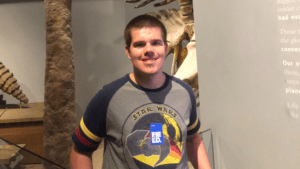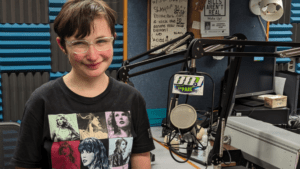This guest post is by Nick Sansone, a young man on the autism spectrum who has been accepted into The University of Chicago for his Masters in Cinema & Media Studies. Nick is applying for the Spring 2020 Making a Difference Autism Scholarship via the nonprofit KFM Making a Difference started by me, Kerry Magro. I was nonverbal till 2.5 and diagnosed with autism at 4 and you can read more about my organization here. Can I ask for a favor? I’m trying to make this nonprofit self-sufficient so I can make this my full-time job supporting the special needs community and would appreciate you taking a minute before reading on to watch this video below and subscribing to our Youtube page here to get to learn more about the work we do in the community.
I hope you can support my nonprofit like I’m trying to support these students with scholarship aid for college. Learn more on how you can help our cause with a small donation (just asking for $3 today, equal to your daily cup of coffee) here.
It was something I will always remember. Well, maybe not vividly, considering I was only seven years old, but it was a moment that in many ways set the course for my life. My dad popped some popcorn and put in a VHS tape of the movie Home Alone. Watching that movie for the first time as a seven-year-old boy was an empowering experience. Seeing how Kevin McCallister was able to take control of his situation and defend his house and himself from the Wet Bandits was, while funny and entertaining, also very inspiring to me. To understand why, you’ll need to go back a few years too when I was three years old.
I was first diagnosed with hyperlexia, meaning that I taught myself how to read precociously. I could plow through children’s books and understand everything, and yet it took me years before I even asked my parents a question. Once I started school, it become even clearer that I was on the autism spectrum as I had a difficult time socializing with my peers. While I became close to my teachers and paraprofessionals, I didn’t really make any close friends my first few years. On top of that, because of sensory issues, I hated to draw and write by hand, so much of my early creativity stayed bottled up within me, only coming out through the stories I would act out with my Thomas the Tank Engine toys. However, after seeing Home Alone (and it’s sequels), something clicked and my childlike creativity inspired me to come up with my own sequel.
With some help from my dad, I typed a 60-page screenplay on Microsoft Word entitled Home Alone 5: Lost in Chicago and printed out a bunch of copies that were distributed to family at my eighth birthday party (which, predictably, was Home Alone-themed). Soon after, I began to open up more to other kids at school, and later that year I founded an after-school “Movie Club,” where kids from my class would come to my house on Fridays and watch movies. While I was not particularly close with everyone in “Movie Club,” the fact that we all had a common interest in movies made communication easier for me, and thus my social life took a dramatic turn for the better. In addition, I was given a camcorder for Christmas that year, and I began making short films with my LEGOs.
Everything seemed to be going great until around fifth grade, when I began to realize that peers I thought were my friends were bullying me. They thought my difficulty in understanding social cues, my lack of social confidence, and my tendency to get intensely worked up were all hilarious, and they proceeded to take advantage. By the time sixth grade came, I would cry every morning before school. I shut down and pushed everyone my age out of my life. I felt isolated and powerless, and I truly did not believe in myself. It was around this time I rediscovered my love for film after my parents showed me M. Night Shyamalan’s The Sixth Sense. That film, which seemed to understand the social isolation I felt as a young boy who was different than everyone else, inspired me to begin writing screenplays again.
Throughout middle school — a time when I was deeply isolated, stuck in low-level classes because of my “special needs” classification, and would go through an entire school day without talking to anyone — I found solace in watching movies and writing screenplays, and I began to express how I was feeling through those screenplays. As my passion for film and screenwriting grew and my social life remained nonexistent, my parents became convinced that I needed a fresh start, so we ended up moving thirty minutes south from our home in Highland, Indiana to Crown Point, where my mother taught at Crown Point High School. After I entered CPHS as a freshman, I slowly started opening myself up socially again, getting involved in theatre and the school’s Film Society, and soon found myself a strong supporter and mentor in Mr. Gloff, who was creating a TV news program at the school and who was amazed by my passion and encyclopedic knowledge of film.
By my sophomore year, I was able to join the program and was given my own biweekly segment called “Nick’s Flix,” where I reviewed movies. My status in the school shot up almost instantly as everyone knew me as the guy from “Nick’s Flix” so they knew they could talk movies with me. The sharply increased confidence I developed from being able to share my passion for film allowed me to be more open to friendships with my peers and led me to push myself as a student by taking Honors and AP-level courses in English, U.S. History and Government.
By the end of my junior year, I found myself hanging out with friends almost every weekend and pushing myself socially in ways I never anticipated. At the encouraging of Mr. Gloff and my principal, I traveled to Indianapolis to participate in the Indiana Youth Leadership Forum, a week-long conference for teenagers with disabilities to learn leadership and self-advocacy skills. Not only did this conference force me to truly consider myself a leader in my community, it also helped me learn to take pride in the fact that I have autism. To learn that something I had long considered a weakness could actually be a strength was monumental for me, and from that point on, I decided to be a role model for other young people with autism and to push myself in every area of my life, not only for myself, but to show others that as long as they have a passion and a drive, no disability should ever hold them back from doing what they want. I was going to define autism. Autism was not going to define me.

Follow my journey on Facebook, my Facebook Fan Page, & Instagram!
My name is Kerry Magro, a professional speaker and best-selling author who is also on the autism spectrum that started the nonprofit KFM Making a Difference in 2011 to help students with autism receive scholarship aid to pursue a post-secondary education. Help support me so I can continue to help students with autism go to college by making a tax-deductible donation to our nonprofit here.














